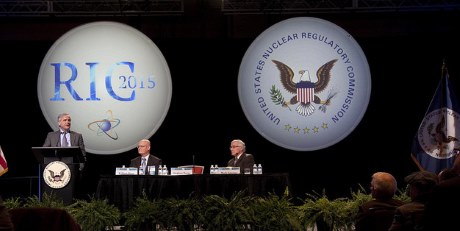No mid-life crisis for NRC
11 March 2015
The head of the USA’s Nuclear Regulatory Commission (NRC) has vowed the agency will provide an effective and efficient service for years to come.
 |
| Stephen Burns makes his keynote address to the NRC conference (Image: NRC) |
Chairmen Stephen Burns spoke at the NRC’s 27th annual Regulatory Information Conference in Rockville, Maryland as the agency celebrates its 40th anniversary.
The NRC has undergone significant changes to its processes to arrive at what Burns described as the current "regulatory paradigm". Seminal moments included the Browns Ferry fire of 1975, which damaged control cables and resulted in an 18-month plant shutdown; the Three Mile Island accident of 1979; the 9/11 terrorist attacks of 2001; and the Fukushima Daiichi accident of 2011. On the whole, Burns said, the NRC's structure had thus far served it well and contributed to a record of effective regulation.
"We have learned from experience and have adapted to the challenges put before us. And as we look to the future, there are certain aspects of the NRC that will remain unchanged, namely our commitment to ensuring that civilian uses of nuclear energy and radioactive material do not pose a threat to the public health and safety or the common defence and security," he said.
Burns likened the NRC's anniversary to the 40-year licence renewal period for US nuclear power plants, providing an opportunity for the agency to prepare for its future. Although the wave of new US reactor licensing applications anticipated a decade ago had not materialized as expected, largely due to the economic downturn, the NRC still faces an increased workload in other areas. He identified the regulatory response to the Fukushima Daiichi accident, the early retirement and therefore unexpected decommissioning of several reactors, cyber security issues, and preparing and reviewing licensing applications for medical isotope production and small modular reactors (SMRs) as contributing factors. Furthermore, US reactor operators are soon expected to begin submitting licence renewal applications to take reactor lives beyond 60 years, and the regulator must be ready to respond accordingly.
In June 2014 the NRC embarked on a major initiative, Project Aim 2020, to identify ways to improve efficiency safety, security and safeguards missions while streamlining processes and limiting costs. He noted that the NRC's recent 2016 budget proposal anticipated "leaner resource requirements" and demonstrated its commitment to more efficient operation.
New technologies
Over the next decade, Burns said the NRC expected to see SMRs and 'Generation IV' advanced reactor technologies being brought forward for regulatory evaluation and licensing approval. The NRC is "willing and able" to work with industry, the public, and the international community to develop an appropriate regulatory framework for such new technologies and is working to stay abreast of industry's commitment to advanced reactor designs.
The NRC would be able to effectively manage such applications, Burns said, but he recognized that vendors would seek greater clarity in the requirements for applications and review standards for such reactors than the agency can perhaps currently provide. "The NRC is taking a hard look at this area; however, without a specific applicant, and with intense pressure on resources and budget, it is challenging for the NRC to be too forward-leaning and expend significant resources on the development of a new regulatory framework," he said.
The annual Regulatory Information Conference is attended by nearly 3000 participants from over 30 countries, and is designed to encourage informal and open dialogue on issues related to the regulation of nuclear power plants through a three-day technical program.
Researched and written
by World Nuclear News